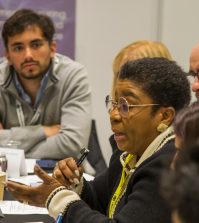Incentives must change to address fraud, says UK deputy director

Until the UK government created a strong, central policy and delivery architecture to tackle fraud in government services, most civil servants were not incentivised to seek out fraud, the Cabinet Office’s deputy director for public sector fraud told an audience at Innovation 2019 last week.
Speaking on Thursday at Global Government Forum’s international conference, Mark Cheeseman said: “About five years ago there were very few incentives to find fraud, outside of HM Revenue & Customs and welfare,” he replied. “Because what would happen is, if you found fraud, you’d be criticised: you’d have to explain what you had done wrong and how you were going to sort it out. If you didn’t find fraud, nothing would happen. So, the whole system was incentivised for people to not find fraud.”
Then the government produced a strategy, set up a central unit, and acted to promote data-sharing and create cross-government processes and services – as former debt programme director Sunil Shahaney told Global Government Forum last autumn. Last year, the civil service also established a Government Counter Fraud Profession (GCFP).
Now, said Cheeseman, “we have created a system where if a public body doesn’t find fraud, that is also a concern, and the starting-point of a conversation; and that incentivised them to do better to find it in the first place.”
Seek and ye shall find
The GCFP has about 3,500 people, and will have about 10,000 “over the next few years”, Cheeseman said. “By bringing people together across government we’re empowering them, and saying: ‘What you’re doing is really important; where should we go next?’”
Nowadays, the government estimates total public sector fraud and ‘error loss’ at £31bn-48bn (US$41-63bn) per year – and an annual cross-government fraud ‘landscape report’ tracks progress. But Cheeseman noted that after data collection, there is a broader challenge with interpretation: “Local authorities publish information on fraud [but] the challenge is that you need people to be able to understand the data,” he said.
“My local council does it, and I look at the numbers and think ‘those numbers [cases of fraud] are really low’,” he continued. “My mum looks at the same data and says ‘Aren’t they doing well!?’” The reality, Cheeseman implied, is that councils may be failing to spot a proportion of the fraud committed against them.
Bringing new tech to bear
Cheesman’s key message was supported by his fellow panellist Dmitri Jegorov, deputy secretary-general for tax and customs policy in Estonia’s Ministry of Finance: “If you don’t see fraud it probably means your systems for fraud protection aren’t working. Because fraud is there, it’s a part of life,” he said.
Jegorov highlighted the value of new technology in tackling fraud, including blockchain – citing an example from the Baltic state related to tracking spending on fuel.
“Taxes account for half of the fuel sales price, so there are attractive opportunities to cheat on taxes,” he explained. So the government tracks the movement of all the fuel bought by businesses, using a system that foreshadowed subsequent developments in blockchain.
“Had we known about the possibilities of blockchain technology when we started designing and developing this [system], we would most probably have used blockchain technology. This is precisely what blockchain allows: to guarantee the whole value-chain of a transaction down to the last customers,” Jegorov said. “Basically we designed a blockchain scheme without using the blockchain.”
Innovation 2019 brought together civil servants from 39 countries to explore how to promote innovation in government. Our first report on the event covered the procurement session and the UK’s work to promote buying from SMEs; more will follow over the coming days. This article has been amended to remove the suggestion that civil servants were deliberately turning a “blind eye” to fraud.























